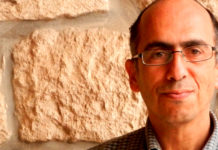The myriad cybersecurity, AI, and IoT startups emerging out of Israel’s state-funded organizations have extensive ties to American Fortune 100 companies like Apple, Google, Microsoft, and many others.
by Raul Diego
Jul 27, 2020
“mastermind in the field of cyber espionage” will be awarded a lifetime achievement by the state of Israel in September. The “Israel Defense Award” ceremony is slated to take place in the residence of President Reuven Rivlin, himself a former member of the IDF’s intelligence corps, Haman, which is tasked with “collecting, disseminating, and publishing intelligence information.” In addition, prizes will also be handed out to members of three secret cybersecurity projects developed by Mossad, the IDF, the Shin Bet and MAFAT (Administration for the Development of Weapons and Technological Infrastructure) that have made a “long-standing contribution to national security and for initiating many technological solutions”, not to mention the forging of close ties to the U.S. National Security state.
The identity of the “legendary” Israeli spy who is slated to receive the official commendation has not been revealed and has only been referred to as “Aleph“; said to be in his forties and well-known both in Israeli and American intelligence circles. He is described as a “phenomenon” of the cyber field who turned down a lucrative career in the tech industry in order to serve the national interest. The mystery-man was credited with creating a “significant part” of the work in Israeli cybersecurity by an unnamed acquaintance.
Current Israeli Defense Minister and Alternate Prime Minister, Benny Gantz announced the winners and heaped praise on Israel’s “human capital,” whose work proves that there are “no borders in the war on Israel’s security.” Indeed, this statement by the IDF’s former chief of staff can be corroborated by taking a look at the corporate partners who are a part of the winning projects; the first of which is a joint collaboration between the Israeli national intelligence agency, Mossad, the Rafael Company, the Israeli Air Force and a new IDF Intelligence Unit 9900, which “provided the IDF with unique capabilities” and “technological breakthroughs.” The Rafael Company, (Rafael Advanced Defense Systems Ltd.), is also involved in the second project to be recognized by the Israeli state, along with Elbit Systems. Both of these companies have major cybersecurity contracts outside of Israel and the U.S., in particular
Critical infrastructure
Elbit Systems received a contract from the U.S. government last year to build an “integrated” surveillance system across the Arizona-Mexico border spanning over 200 linear miles. They have since deployed dozens of “sophisticated” cameras on towers along the border and have also secured multi-million dollar contracts to equip an unnamed Southeast Asian navy’s ships with their AI-enabled technology for “complex reconnaissance missions.”
The Rafael Company, meanwhile, is a major player in international weapons systems development and is the principal creator of the “Iron Dome” anti-missile technology through a subsidiary company, mPrest. The Iron Dome software is currently running on “critical infrastructure systems” in the United States and has been a recent subject of concern for the U.S. military, who refused to integrate the software into its air defense systems after the Israeli company failed to provide the source code, resulting in the loss of a $600 million-dollar contract for the Tel-Aviv-based company.
The Rafael Company subsidiary, nevertheless, has partnered with several American utility companies, providing “mission-critical monitoring” services to sectors of the U.S. power grid. mPrest’s “System of Systems” has been integrated by San Diego Gas & Electric (SDG&E), Southern Company – the second-largest utility company in the United States – and others. The New York Power Authority (NYPA) entered into a partnership with the Israeli company in 2017 to deploy their technology in a number of utility plants across the state.
In the official statement issued by Gantz announcing the prize winners, he gave special attention to the fact that their work “was done in secret,” while President Rivlin lauded the “long nights, days, weeks and months of exhausting and grueling work” put forward by the recipients of the Eliyahu Golomb award, named after the commander and chief architect of the Haganah (the Defence) militia – a paramilitary organization that would eventually become the IDF after the founding of the Jewish state and progenitor of terrorist organizations like Irgun and the Stern Gang.
Old collaborators
The history of the Haganah provides a unique look into the permanent relationship between certain U.S. interests and the state of Israel, dating back to its gestation period during the British mandate of Palestine, as well as a direct link to Israel’s present-day cybersecurity technology apparatus through a young RCA engineer from New York, Dan Fliderblum, who was recruited by the Zionist guerilla to set up a “network of secret radio transmitters in Palestine” to protect their illegal arms smuggling operation. Fliderblum would later change his name to David Avivi and pioneer the Isreali electronics industry.
At the time, an organized crime association comprised of the Sicilian and Jewish mafias, often referred to as “Murder, Inc.” controlled the Port of New York. Meyer Lansky, as leader of the New York crime families, was approached by Haganah operative and close aid to Ben-Gurion, Yehuda Arazi, to help move weapons to Palestine. Arazi was an underground agent who had been doing Ben-Gurion’s bidding throughout Europe for years and was sent to the United States by the future first Prime Minister of Israel to procure heavy armaments, including “aircraft, artillery pieces, tanks [and] antiaircraft guns.”
Jewish mobsters in the United States would henceforth play a pivotal role in obtaining and providing financial and other resources to the Haganah. Notorious Jewish gangsters, like Bugsy Siegel, Longy Zwillman, and Moe Dalitz, met with another Haganah agent every week in 1946 in the back of a Los Angeles restaurant to arrange or deliver money to finance the ongoing war in Palestine.
The extent of the mob’s involvement in these operations came to light when the FBI seized a B-25 bomber obtained by the “syndicate” was forced to return to Newark by bad weather, causing the entire shipment of aircraft, which included twenty AT-6 airplanes, to be confiscated.
As for the man whose name dons the prize Israel will award its undisclosed cyber-tech heroes in a few months’ time, it was his arguments in favor of a “much more extensive and orderly defensive force,” that convinced Ben-Gurion to move ahead with the creation of the IDF and, along with it, the establishment of less suspect partnerships that wouldn’t hinder the social advancement of the Jews involved, like the case of Miami mob figure Sam Kay, who it is claimed, was motivated to aid the Haganah’s arms-smuggling operation to “clean up” his own image and help his daughter marry up.
The candidates
The partners of today’s IDF-linked tech initiatives read more like a blue-chip investment portfolio than a police rap sheet, but the scope of the crimes dwarf those that occurred in the days of jukeboxes and trench coats. The myriad cybersecurity, AI, and IoT startups emerging out of Israel’s state-funded organizations have extensive ties to Fortune 100 companies like Apple, Google, Microsoft, and many others. The vast majority of these startups originate in military outfits like Unit 8200, which has been the center of offensive cyber warfare technology like Stuxnet, co-developed with the United States to take down an Iranian nuclear facility in 2010, among other covert operations and initiatives.
While Israel won’t reveal the names of the winners selected for the Israel Defense prize awarded every year for the past six decades, we can take a few educated guesses as to who might have been some of the finalists. People like Lior Div come to mind; founder of a cybersecurity company called Cybereason, which has been running simulations on behalf of the U.S. government of a foreign-hacked 2020 general election. The table-top exercise predicted dozens of dead Americans, hundreds injured, and an election that never happens.
Div fits the age-range given for the winner of the lifetime achievement award but would be eliminated from consideration if we take the claim seriously that the recipient shied away from the millions he could have made in the private sector. Lior Div’s company is currently valued at just over $1 billion and his own net worth can be assumed to be near that, at least.
There are other potential nominees, such as Amit Yoran, who certainly fits the bill of an individual who is “known in [the Israeli] and the American intelligence community” as reported in several pieces about the mysterious “Aleph.” Yoran fits the age profile, as well, and as former Cybersecurity chief at DHS has the credentials to be recognized in both the halls of the Mossad and CIA’s Langley headquarters. But, he too has thrown his hat into the private sector many times and is currently CEO of a cybersecurity firm called Tenable, which offers solutions to address “vulnerabilities and misconfigurations in your modern IT environment.”
If lifetime achievement is the true criteria, then former head of Mossad, Tamir Pardo, might be considered as the potential candidate that could claim that a “not insignificant part of [Israel’s Defense] work was created by him personally due to his special talent.” Pardo served under Bibi Netanhayu’s brother, Yoni’s military command, and has been a member of Israel’s top brass for a very long time. Pardo once described Mossad as a “criminal organization with a license.” But, far from a critique, Pardo followed his controversial statement by admitting it was “the fun part.”
Feature photo | Israel’s Electric Corp vice president, Yasha Hain, second left, and Ofir Hason, watch a cyber team work at the ‘CyberGym’ school in the coastal city of Hadera. Dan Balilty | AP
* Raul Diego is a MintPress News Staff Writer, independent photojournalist, researcher, writer and documentary filmmaker.
Published at https://www.mintpressnews.com/israel-dystopian-cyber-espionage-award-us-backed-digital-saboteurs/269785/











